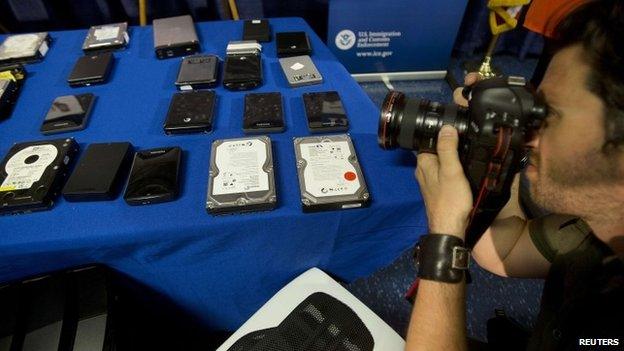Dozens charged in New York child porn swoop
- Published

Law enforcement officials displayed some of the hundreds of devices seized during searches
A police officer, rabbi and a nurse were among more than 70 people arrested in the US for allegedly sharing child pornography online.
They were charged as part of a five-week operation led by the US Homeland Security department in New York.
More than 600 laptops, smartphones and other computer devices were seized as part of the effort.
Officials say many of the defendants had access to young children but there were no reports of abuse.
The special agent in charge of investigations at Immigrations and Customs Enforcement (ICE) in New York said the sheer volume and professional backgrounds of the alleged child porn traders was "troubling".
Special Agent in Charge James Hayes: "These defendants come from all walks of life''
"We can no longer assume that the only people who would stoop to prey on children are unemployed drifters," said James Hayes Jr.
They began the investigation after the January arrest of a suburban New York police chief, Brian Fanelli, on charges of knowingly receiving and distributing child pornography.
Mr Fanelli has pleaded not guilty.
Beginning in April, Homeland Security agents posed as collectors of child porn who were offering to anonymously trade material through online file-sharing programmes.
They then identified the IP address of the sources of the material and subpoenaed internet service providers for the names of the people behind the files.
Mr Hayes said some of those arrested seemed eager to admit the guilt when agents went to complete searches of the most active and recent traders.
"We had some individuals tell us, 'I know why you're here. I was waiting for this. I knew this would happen someday,'" he said. "That's not something you find from someone who's trafficking cocaine or money-laundering."
The seized devices will be examined by agents to catalogue evidence.
The National Center for Missing and Exploited Children will use its analysts to review the images to see whether it can identify children using databases of known victims.